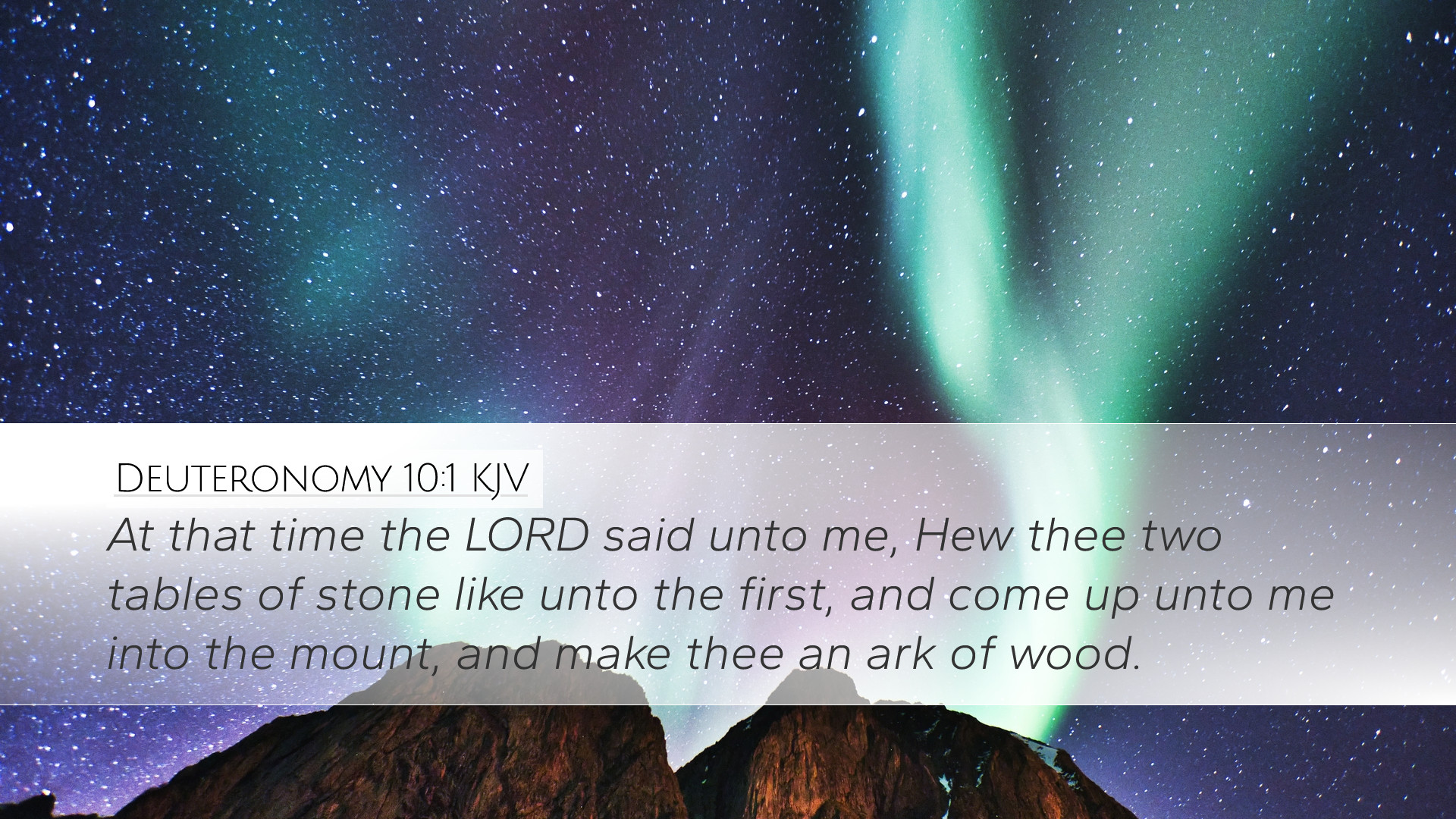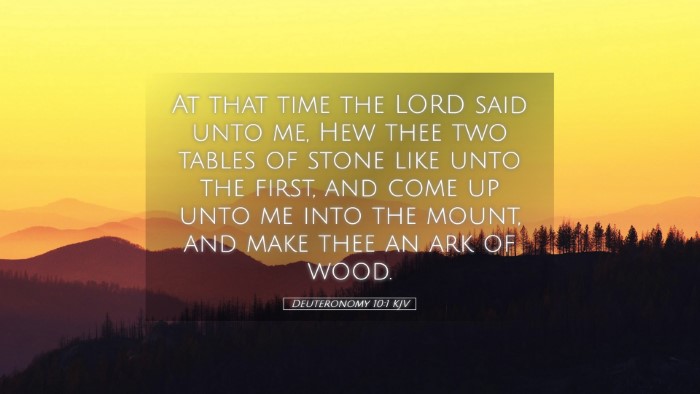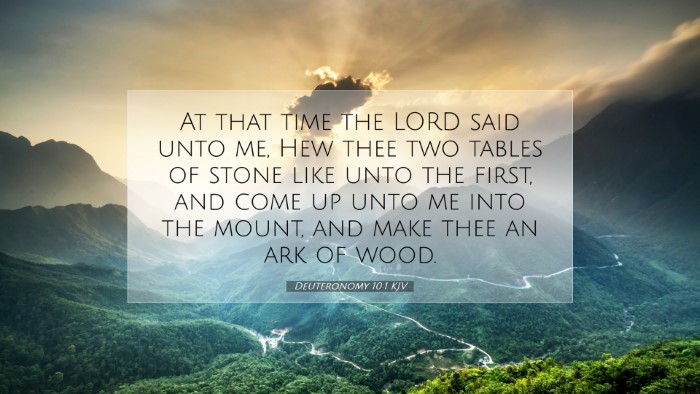Commentary on Deuteronomy 10:1
Deuteronomy 10:1 states: "At that time the LORD said to me, 'Chisel out two stone tablets like the first ones and come up to me on the mountain. Also make a wooden ark for the tablets.'" This passage is rich in meaning and significance, not only within the context of the historical narrative but also in its theological implications. In this commentary, insights from Matthew Henry, Albert Barnes, and Adam Clarke are woven together to provide a comprehensive understanding.
Contextual Background
Deuteronomy is essentially a series of speeches by Moses on the plains of Moab just prior to Israel’s entry into the Promised Land. It serves as a retrospective reminder of God’s covenant with Israel and prepares the new generation for future challenges.
In Chapter 10, Moses recounts the events after Israel's sin with the golden calf, an act of idolatry that prompted God's anger. Consequently, God instructed Moses to prepare new tablets of stone, as the first ones were broken in response to the people's sinfulness.
Divine Instruction and Renewal
This verse encapsulates a profound moment of renewal and restoration in the covenant relationship between God and Israel. The command to “chisel out two stone tablets” signifies the importance of the Law and God’s desire to re-establish His covenant despite previous transgressions.
- Matthew Henry: He notes that the breaking of the first tablets symbolized the breaking of God’s covenant through disobedience. The new tablets represent mercy and the possibility of reconciliation, underscoring the theme of God’s grace. Henry highlights that God continues to reach out to His people, willing to renew His covenant with those who have erred.
- Albert Barnes: Barnes emphasizes the act of chiseling the tablets, pointing to the active involvement of Moses in this process. He notes that it symbolizes a fresh commitment and responsibility on the part of God's people to uphold His commandments. He draws attention to the significance of the tablets being placed in an ark, pointing towards the sacredness and centrality of the Law in Israel's worship and community life.
- Adam Clarke: Clarke interprets this directive as a reflection of God’s justice and mercy. He expresses that while God's judgment is deserved due to disobedience, His willingness to provide new tablets signals hope and renewal. Clarke also connects this moment with the nature of God’s grace where He provides means for redemption even when humanity falters.
The Ark of the Covenant
In the same verse, the instruction to “make a wooden ark for the tablets” is critical. The ark later becomes a central symbol in Israel's religious life.
- Matthew Henry: He discusses the significance of the ark as the place where God dwells with His people. He highlights how the ark serves to remind Israel of God's continual presence and covenant love.
- Albert Barnes: Differentiating between the tablets and the ark, Barnes points out that the tablets contain God's law, while the ark represents His covenant relationship. The ark also prefigures the coming of Christ as the ultimate fulfillment of God's law and presence among His people.
- Adam Clarke: Clarke relates the ark to the idea of God’s provision and guidance, suggesting that just as the ark was a physical representation of God’s covenant, so too is the heart of the believer meant to house the law of God through the Holy Spirit.
Theological Implications
Theologically, Deuteronomy 10:1 serves as a reminder of God’s unwavering commitment to holiness, justice, and grace. It presents a dynamic understanding of how God interacts with His people and the importance of their responsiveness to His commands.
- Repentance and Renewal: This passage reflects the biblical principle of repentance, demonstrating that God provides opportunities for renewal after sin. The act of chiseling out new tablets shows that God does not abandon those who fail but invites them back into relationship with Him.
- Covenant Relationship: The command to create the ark signifies the gravity of covenant relationships. God’s expectation is that His laws are to be upheld and revered, serving as a guide for His people’s conduct.
- Foreshadowing Christ: Scholars have often connected the Tablets of Stone and the Ark of the Covenant to broader redemptive themes unveiled in the New Testament, culminating in Christ. The law reveals the nature of sin and the need for salvation, which is fulfilled through Jesus Christ.
Practical Applications
For contemporary audiences—pastors, students, theologians—the insights from Deuteronomy 10:1 can inspire several practical applications:
- Emphasis on God's Mercy: Leaders can reflect on the nature of God’s grace and encourage congregations that there is always a path back to Him, regardless of past failures.
- Prioritizing the Law: Understanding the significance of God’s commandments in guiding moral and ethical living can help believers cultivate a deeper reverence for scripture.
- Covenantal Living: Christians are called to live in a way that honors their covenant with God, integrating the principles of faith into every aspect of life.
Conclusion
Deuteronomy 10:1 stands as a powerful testament to God’s enduring love, His justice in the face of sin, and His gracious invitation for new beginnings. By examining insights from various commentators, it becomes clear that the themes of renewal, covenant, and mercy are not only foundational to the narrative of Israel but resonate profoundly within the church today. As we engage with this text, may we find both caution and comfort, striving to uphold our relationship with God as we reflect upon His commands.


